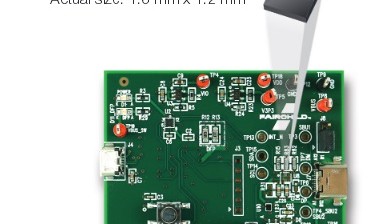New Fairchild USB type-C portfolio
July 24, 2015
on
on

Fairchild semiconductor has announced a range of tiny, low-power USB Type-C support chips. The controllers communicate through I2C which allows for reuse of an existing microprocessor and provides flexibility to reflect any future specification changes in software.
The Fairchild portfolio includes USB power switches and SuperSpeed switches. The USB 3.1 SuperSpeed switches are claimed to have best-in-class performance, packaged in the smallest possible footprint with active power consumption lower than solutions from other manufacturers. The power switch family supports the Type-C VBUS requirements for various charging levels along with competitive RDSON and selectable protection features.
Key features of the USB chip portfolio:
• Ultra-low-power consumption in standby mode
• Small solutions in WLCSP and MLP packages, as small as 1.2 x 1.2 x 0.4 mm
• Flexible to accommodate standard changes
• Dual Role Port (DRP) and Downstream / Upstream Facing Port (DFP, UFP) role support
• Active cable detection and power support
• Thin USB Power Delivery (PD) interface for adaptive charging and vendor-defined messages
• Audio and Debug Accessory Detection
Altogether, six devices have been announced so far: the FUSB300C programmable USB type-C controller, FUSB301 autonomous type-C controller with super-speed switch control, FUSB301A autonomous controller with configurable I2C address, the FUSB302 programmable controller with Power Delivery interface, the FUSB3301 autonomous power adapter controller and the FUSB 340 USB 3.1 SuperSpeed switch. For more details read the Fairchild press release.
The Fairchild portfolio includes USB power switches and SuperSpeed switches. The USB 3.1 SuperSpeed switches are claimed to have best-in-class performance, packaged in the smallest possible footprint with active power consumption lower than solutions from other manufacturers. The power switch family supports the Type-C VBUS requirements for various charging levels along with competitive RDSON and selectable protection features.
Key features of the USB chip portfolio:
• Ultra-low-power consumption in standby mode
• Small solutions in WLCSP and MLP packages, as small as 1.2 x 1.2 x 0.4 mm
• Flexible to accommodate standard changes
• Dual Role Port (DRP) and Downstream / Upstream Facing Port (DFP, UFP) role support
• Active cable detection and power support
• Thin USB Power Delivery (PD) interface for adaptive charging and vendor-defined messages
• Audio and Debug Accessory Detection
Altogether, six devices have been announced so far: the FUSB300C programmable USB type-C controller, FUSB301 autonomous type-C controller with super-speed switch control, FUSB301A autonomous controller with configurable I2C address, the FUSB302 programmable controller with Power Delivery interface, the FUSB3301 autonomous power adapter controller and the FUSB 340 USB 3.1 SuperSpeed switch. For more details read the Fairchild press release.
Read full article
Hide full article


Discussion (0 comments)